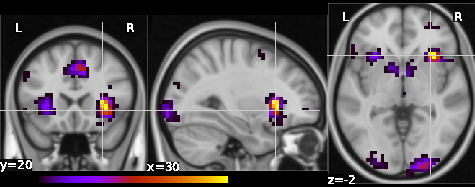Section: New Results
Randomized cluster-based predictive model
Participants : Gaël Varoquaux [Correspondant] , Bertrand Thirion, Alexandre Gramfort.
Functional neuroimaging can measure the brain's response to an external stimulus. It is used to perform brain mapping: identifying from these observations the brain regions involved. This problem can be cast into a linear supervised learning task where the neuroimaging data are used as predictors for the stimulus. Brain mapping is then seen as a support recovery problem. On functional MRI (fMRI) data, this problem is particularly challenging as i) the number of samples is small due to limited acquisition time and ii) the variables are strongly correlated. We propose to overcome these difficulties using sparse regression models over new variables obtained by clustering of the original variables. The use of randomization techniques, e.g. bootstrap samples, and clustering of the variables improves the recovery properties of sparse methods. We demonstrate the benefit of our approach on an extensive simulation study as well as two fMRI datasets.
More details can be found in [32] .
|



